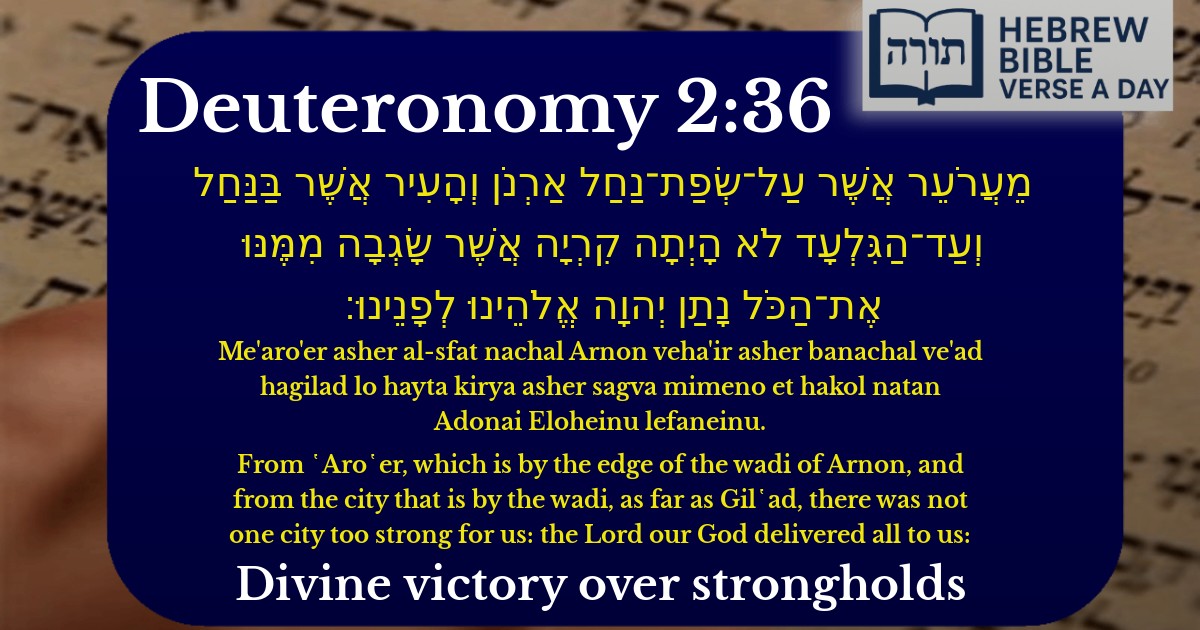Join Our Newsletter To Be Informed When New Videos Are Posted
Join the thousands of fellow Studends who rely on our videos to learn how to read the bible in Hebrew for free!
Hebrew Text
מֵעֲרֹעֵר אֲשֶׁר עַל־שְׂפַת־נַחַל אַרְנֹן וְהָעִיר אֲשֶׁר בַּנַּחַל וְעַד־הַגִּלְעָד לֹא הָיְתָה קִרְיָה אֲשֶׁר שָׂגְבָה מִמֶּנּוּ אֶת־הַכֹּל נָתַן יְהוָה אֱלֹהֵינוּ לְפָנֵינוּ׃
English Translation
From ῾Aro῾er, which is by the edge of the wadi of Arnon, and from the city that is by the wadi, as far as Gil῾ad, there was not one city too strong for us: the Lord our God delivered all to us:
Transliteration
Me'aro'er asher al-sfat nachal Arnon veha'ir asher banachal ve'ad hagilad lo hayta kirya asher sagva mimeno et hakol natan Adonai Eloheinu lefaneinu.
Hebrew Leining Text
מֵֽעֲרֹעֵ֡ר אֲשֶׁר֩ עַל־שְׂפַת־נַ֨חַל אַרְנֹ֜ן וְהָעִ֨יר אֲשֶׁ֤ר בַּנַּ֙חַל֙ וְעַד־הַגִּלְעָ֔ד לֹ֤א הָֽיְתָה֙ קִרְיָ֔ה אֲשֶׁ֥ר שָׂגְבָ֖ה מִמֶּ֑נּוּ אֶת־הַכֹּ֕ל נָתַ֛ן יְהֹוָ֥ה אֱלֹהֵ֖ינוּ לְפָנֵֽינוּ׃
מֵֽעֲרֹעֵ֡ר אֲשֶׁר֩ עַל־שְׂפַת־נַ֨חַל אַרְנֹ֜ן וְהָעִ֨יר אֲשֶׁ֤ר בַּנַּ֙חַל֙ וְעַד־הַגִּלְעָ֔ד לֹ֤א הָֽיְתָה֙ קִרְיָ֔ה אֲשֶׁ֥ר שָׂגְבָ֖ה מִמֶּ֑נּוּ אֶת־הַכֹּ֕ל נָתַ֛ן יְהֹוָ֥ה אֱלֹהֵ֖ינוּ לְפָנֵֽינוּ׃
🎵 Listen to leining
Parasha Commentary
📚 Talmud Citations
This verse is not quoted in the Talmud.


Geographical Context
The verse describes the extent of the Israelite conquest under Moshe's leadership, spanning from עֲרֹעֵר (Aroer) near the Arnon River to הַגִּלְעָד (Gilad). Rashi (Devarim 2:36) explains that Aroer marked the southern boundary of the territory of Sichon, the Amorite king, while Gilad represented the northern limit. The phrase "וְהָעִיר אֲשֶׁר בַּנַּחַל" ("the city that is by the wadi") refers to the main city in the valley, likely the capital of Sichon's kingdom.
Divine Assistance in Conquest
The verse emphasizes that "לֹא הָיְתָה קִרְיָה אֲשֶׁר שָׂגְבָה מִמֶּנּוּ" ("there was not one city too strong for us"). The Ramban (Devarim 2:31) notes that this demonstrates the miraculous nature of the victories—despite the formidable defenses of the Amorite cities, none could withstand Bnei Yisrael because Hashem fought for them. The Sforno adds that this was a fulfillment of Hashem's promise to Avraham (Bereishit 15:16) that his descendants would inherit the land.
Theological Significance
Historical Lessons
The Netziv (Ha'amek Davar) highlights that this verse serves as a reminder for future generations: just as Hashem enabled the conquest of seemingly impregnable cities, He would continue to assist Israel when they adhered to the Torah. The mention of specific locations also reinforces the historical authenticity of the narrative, countering claims that the conquest was merely allegorical.